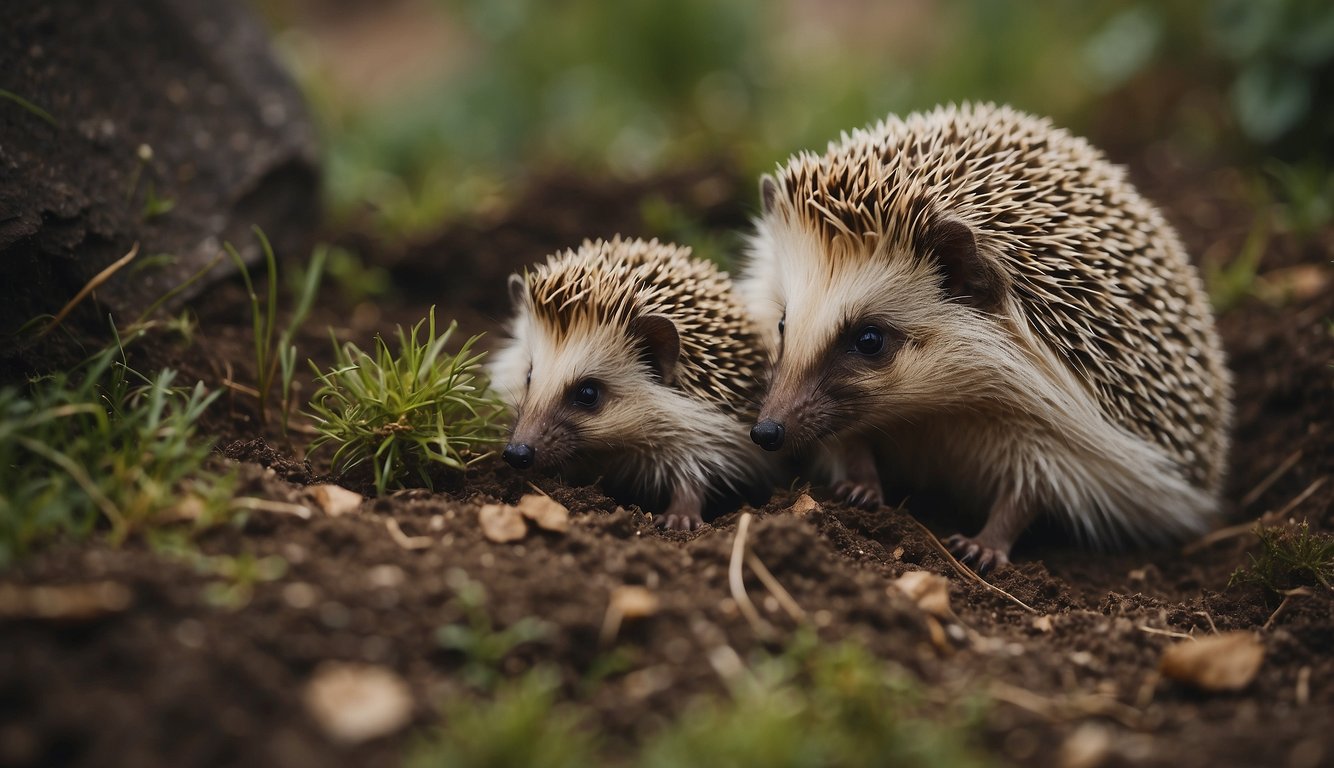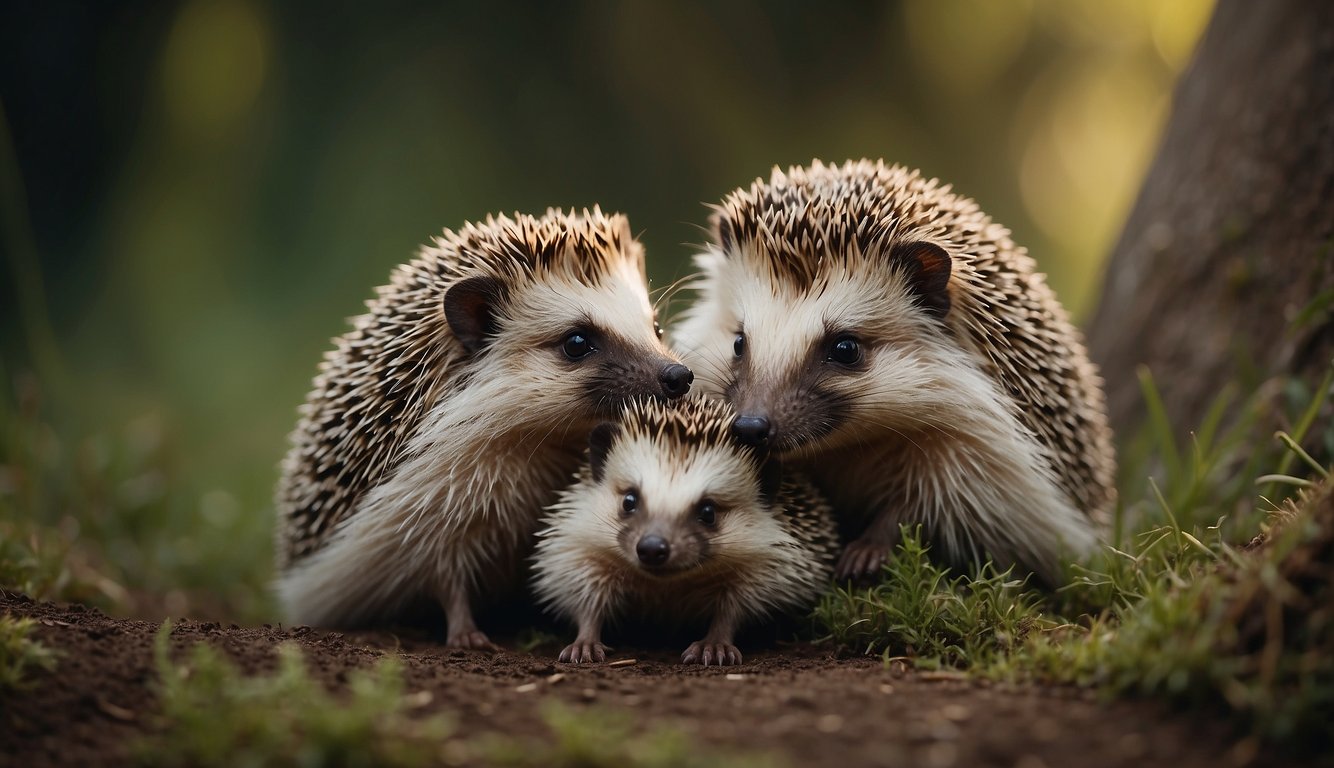Caring for hedgehogs, especially when they have young, requires an understanding of their behaviors and needs. While the concept of hedgehogs eating their offspring may be distressing, it’s a behavior that can occur under certain circumstances. As a hedgehog owner or breeder, understanding the reasons behind this and how to prevent it is crucial.
Well, we’ll be going over:
- The factors that may lead a mother hedgehog to consume her offspring and how to mitigate these risks.
- Essential care tips for mother hedgehogs and their hoglets, focusing on creating a safe and nurturing environment.
- Properly setting up a hedgehog’s habitat, including diet and housing needs, ensures their well-being and reduces stress.
Let’s dive in and explore how to provide the best care for hedgehogs, particularly in the delicate period when they are raising their young, to avoid any unfortunate behaviors like cannibalism.

Do Hedgehogs Eat Their Babies?
Hedgehogs may eat their babies due to stress, environmental threats, or lack of resources. To prevent this:
- Minimize Stress: Provide a calm, quiet environment for the mother hedgehog.
- Ensure Safety: Create a secure, predator-free area, especially during nursing.
- Adequate Nutrition: Keep the mother well-fed and hydrated to reduce resource scarcity.
- Limit Handling: Avoid excessive handling during the nursing period.
- Spacious Enclosure: Offer enough space for nesting and exploration.
- Separate Males: Keep male hedgehogs away to prevent stress and potential harm to hoglets.
Proper care and a stress-free environment are crucial for the well-being of mother hedgehogs and their offspring.
Understanding Hedgehog Maternal Behavior
In the world of hedgehogs, the mother’s behavior towards her offspring can vary widely and is influenced by several environmental and psychological factors that can, unfortunately, lead to cannibalism in some cases.
Understanding this behavior is crucial to providing the right care for pet hedgehogs and ensuring the safety and survival of the young hoglets.
Factors Influencing Cannibalism
Stress: The most significant factor leading to cannibalism is stress in the mother hedgehog. A stressed mother may perceive the environment as unsafe, including anything from a cage that is too small and excessive handling to the presence of predators.
High stress levels signal to the mother that the chances of survival for her offspring are low, making cannibalism a grim but natural response to prevent the suffering of hoglets who might otherwise not survive.
- Unsafe Environment: If the mother senses danger or a lack of security, she may eat her young to protect them from a perceived threat or reclaim nutrients when facing resource scarcity.
- Presence of Males: The proximity of male hedgehogs can also trigger cannibalism, as they typically do not recognize their offspring and may harm them.
Mother and Offspring Care
Nest Construction: Mother hedgehogs give birth to their young in a nest of leaves, twigs, and other materials, providing warmth and protection from the elements. An adequate and safe nest is essential for the survival of baby hedgehogs, who depend entirely on their mother for warmth and milk during the initial weeks after birth.
- Feeding and Nourishment: The mother’s role also involves feeding her babies with milk and teaching them survival skills as they grow. Ensuring the mother has a calm environment will help minimize stress and encourage proper care for her young.
- Preventing Cannibalism: To prevent such extreme behavior, pet owners must provide a safe, tranquil environment for the mother and offspring. This includes a spacious cage, minimal handling during the nursing period, and protection from potential predators or disturbances.
Careful observation and the right environment can often prevent tragic outcomes and ensure that young hedgehogs flourish under the care of their mother.
Creating a Safe Environment for Hedgehogs

Ensuring hedgehogs feel secure is pivotal to preventing undesirable behaviors such as cannibalism. A proper diet, housing, and a stress-free environment are fundamental for their well-being.
Proper Diet and Housing
A hedgehog’s enclosure should be spacious and clean and have a designated area for nesting. They need ample room to explore and exercise as naturally solitary animals.
The following table outlines the essentials for a hedgehog’s diet and housing needs:
| Diet Needs | Housing Needs |
|---|---|
| Balanced nutrients | Adequate space |
| Consistent supply of food | Secure nesting area |
| Fresh water available | Clean bedding |
Monitoring the weight and health of a hedgehog is crucial. An inadequate diet can lead to health issues that could make them more likely to exhibit harmful behaviors, so ensuring a steady supply of food and water can prevent stress related to scarce resources.
Preventing Stressful Conditions
Hedgehogs are sensitive to their environment and can become stressed by various factors, including noise, the presence of predators, or even excessive handling. To create a stress-free environment:
- Reduce Noise: Maintain a quiet setting, distant from loud sounds and vibrations.
- Minimize Predators: In an outdoor setting, secure the enclosure to protect it from potential threats.
- Optimal Conditions: Regularly check for comfortable temperature and humidity levels to keep the hedgehogs at ease.
By being mindful of their need for safety and reducing stress triggers, one encourages a nurturing atmosphere for hedgehogs, particularly when nursing their young. A protective and stress-reduced environment decreases the likelihood of cannibalistic behavior and supports these creatures’ overall health and welfare.



Leave a Reply